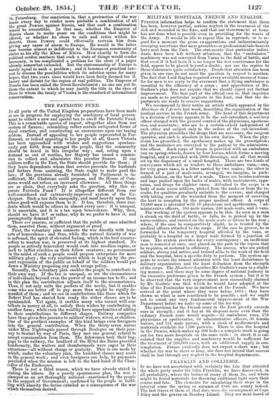MILITARY HOSPITALS, FRENCH AND Egausa
FURTHER information helps to confirm the statement that there has been, however partial, serious neglect in the treatment of the sick and wounded in the East, and that our Government at home has not done what is possible even in providing for the wants of the Army. It would be idle to repeat this in reproach, or to re- gard for a moment the gross exaggerations and indiscriminately sweeping assertions that mere grumblers or professional tale-bearers have sent from the East. The statements that particular indivi- duals have been left without attention, that the " ambulance " machinery was not conveyed from Varna to the field of battle, and that even if it had been it is no longer the best contrivance for the field, appear to be placed beyond a doubt ; nor are the replies to these statements quite satisfactory. Proofs that attention has been given in one case do not meet the question in respect to another. The fact that Lord. Raglan required every available means of trans- fer for men is no reply to the averment that a flying ambulance is essential to the efficiency of a corps; and approbation of Mr.
Guthrie's plan does not require that we should reject yet further improvement. The best part of the official case is, that inquiries are made as to particular neglects in the East, and that the de- partments are ready to receive suggestions.
We recommend to their notice an article which appeared in the Mon iteur de l'Armee last week, describing the organization of the medical service in the French army. The head of this department in a division of troops appears to be the sub-intendant, a military officer charged with the general control of the physicians, apotheca- ries, and assistants ; who are to a certain extent independent of each other and subject only to the orders of the sub-intendant. The physician prescribes the drugs that are necessary, the surgeon operates, and each is absolute in his own duties. When the phy- sician has prescribed, the apothecary makes up the prescription; and the medicines are conveyed. to the patient by the administra- tive officer. Each corps of troops is provided with an ambulance van on spring-wheels, drawn by four horses, which forms a moving hospital, and is provided with 2000 dressings, and all that would set up the dispensary of a small hospital. There are two kinds of conveyance which act as tenders to these ambulance vans,—ona„ for very grave eases, is a litter carried by two mules ; the other is formed of a pair of mule-seats, arranged, we imagine, in pack- saddle fashion, on the back of a mule. There are besides canteens and bags packed upon the backs of mules, with instruments, appa- ratus, and drugs for slighter cases. Attached to the corps is a body of male nurse soldiers, picked from the ranks or from the re- cruits, for qualities peculiarly suitable to the service, and charged with taking care of the wounded from the moment of receiving
the hurt to reception by the proper medical officer. A corps of 10,000 men is provided with 16 physicians and apothecaries, 7 ad-
ministrative officers 104 male nurses, 250 mule-seats, and 5 vans. The working of the system appeein to be this. As soon as a man is struck on the field of battle, or falls, he is picked up by the nurse-soldiers, and carried on the mule-seats or litters to the rear ; where, if the case be comparatively slight, he is treated by the medical officers attached to the corps. If the case be graver, he ia forwarded to the temporary hospital afforded by the vans, or probably to a hospital on a larger scale formed by a junction of vans. The system provides for every contingency : an inefficient man is removed at once, and placed on the path to the repose that he requires, or restored to efficiency. The nurses, who are picked soldiers, strong and active, and trained alike to the work of the field. and the hospital, have a specific duty to perform. The system ap-
pears to secure the utmost attention with the least disturbance to- military organization and the least deduction from the strength
of the corps. The Mon iteur describes Mr. Guthrie's vans in a slight- ing manner, and there may be some degree of national jealousy in the excessive preference given to the French system ; but it is to be observed that the very improvement now successfully claimed by Mr. Guthrie was that which he would have adopted at the time of the Peninsular war in imitation of the French. We have arrived at the point where they were before 1814; they have shown us what is now considered to be possible ; and we ought not to await any very fundamental improvement of the War Department before we make up some of the lee-way. The provision for the French army in the East greatly exceeds ours in strength • and it has at its disposal more even than the ordinary French scale would require-25 ambulance vans, 276 physicians or apothecaries, 54 administrative officers, 50 female nurses, and 751 male nurses, with a stock of medicaments and.
materials available for 7700 patients. There is also the hospital in the Pirieus, which makes up 500 beds ; a complete stock is going out for two more hospitals on the same scale : in short, it is cal- culated that the supplies and machinery would be sufficient for the treatment of 200,000 cases, with an additional supply in con- templation. France evidently does not expect a short war ; but whether the war be short or long, she does not intend that success shall be lost through any neglect in the hospital departments.


























 Previous page
Previous page